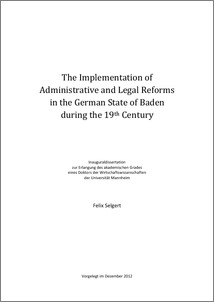|
The implementation of administrative and legal reforms in the German State of Baden during the 19th century
Selgert, Felix
![[img]](https://madoc.bib.uni-mannheim.de/33127/1.hassmallThumbnailVersion/Thesis_Selgert.pdf)  Vorschau |
|
PDF
Thesis_Selgert.pdf
- Veröffentlichte Version
Download (2MB)
|
|
URL:
|
https://madoc.bib.uni-mannheim.de/33127
|
|
URN:
|
urn:nbn:de:bsz:180-madoc-331276
|
|
Dokumenttyp:
|
Dissertation
|
|
Erscheinungsjahr:
|
2012
|
|
Ort der Veröffentlichung:
|
Mannheim
|
|
Hochschule:
|
Universität Mannheim
|
|
Gutachter:
|
Streb, Jochen
|
|
Datum der mündl. Prüfung:
|
21 März 2013
|
|
Sprache der Veröffentlichung:
|
Englisch
|
|
Einrichtung:
|
Fakultät für Rechtswissenschaft und Volkswirtschaftslehre > Wirtschaftsgeschichte (Streb 2011-)
|
|
Fachgebiet:
|
330 Wirtschaft
350 Öffentliche Verwaltung
900 Geschichte
|
|
Normierte Schlagwörter (SWD):
|
Wirtschaftsgeschichte , Verwaltung
|
|
Freie Schlagwörter (Englisch):
|
Economic Growth , Weberian Bureaucracy , Incentive Mechanism , Internal Labor Markets , Administration
|
|
Abstract:
|
In recent years economists and economic historians alike have reconsidered the role of the state as a determinant for a society’s prosperity. These scholars argue that institutions that facilitate broad taxation, support private markets and grant and protect private property are elementary prerequisites for economic growth.
According to these authors, states can influence the prosperity of their society by the degree they are providing these institutions.
But states are no artificial machines that work according to a fixed setup. They are run by people, called bureaucrats. These bureaucrats face incentives which motivate them to implement formal institutional rules correctly or to misuse them for their personal benefit. Even when the formal institutional framework is beneficial for growth, bureaucrats may face incentives to misuse these rules deteriorating the growth perspectives of a society. For these reasons, the rules and regulations that frame bureaucrats’ incentives to adhere to the formal institutional framework are an important component for a society’s economic fate.
However, there are relatively few studies which consider the importance of an efficient, uncorrupt bureaucracy for economic growth. There are even fewer studies that ask how such an efficient bureaucracy can be established. The goal of the present thesis is to close this gap. Thereby it concentrates on the internal dynamics of an administration after the introduction of an efficiency-enhancing organization. More explicitly, this study asks how rules and regulations that govern employment dismissal, promotion and remuneration of bureaucrats shaped the latter’s incentives to implement or to misuse the formal administrative and legal framework. In a second step, I attempt to measure whether administrative reform had an effect on the efficiency of the bureaucracy.
The thesis provides a detailed case study of local bureaucrats, called district magistrates (Amtmänner) in the German state of Baden during the late 18th and 19th century. The study builds on an extensive set of archival material from the Generallandesarchiv in Karlsruhe including information about district magistrates’ remuneration and their performance in regard to the implementation of the formal administrative and legal framework.
|
 | Dieser Eintrag ist Teil der Universitätsbibliographie. |
 | Das Dokument wird vom Publikationsserver der Universitätsbibliothek Mannheim bereitgestellt. |
 Suche Autoren in Suche Autoren in
Sie haben einen Fehler gefunden? Teilen Sie uns Ihren Korrekturwunsch bitte hier mit: E-Mail
Actions (login required)
 |
Eintrag anzeigen |
|
|
